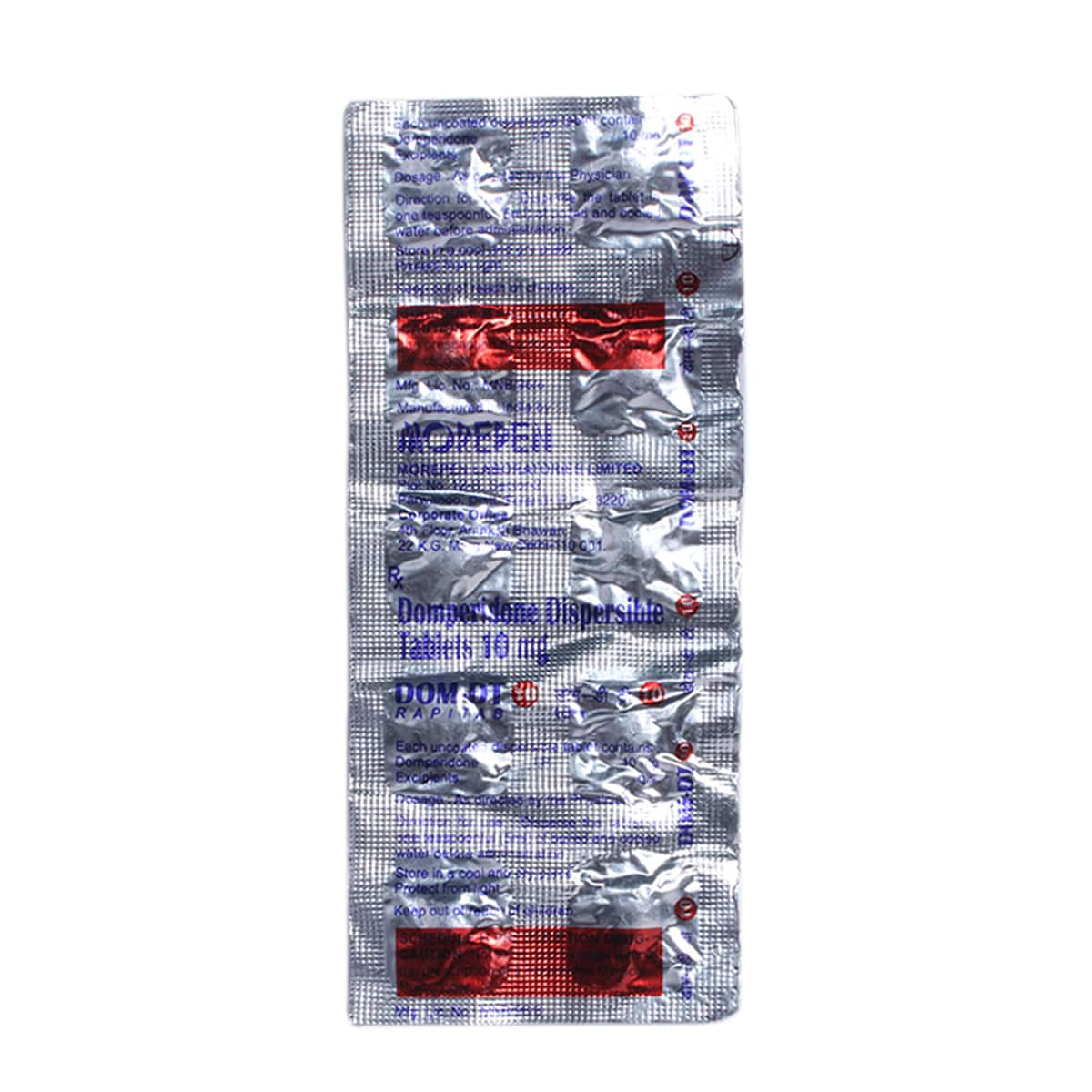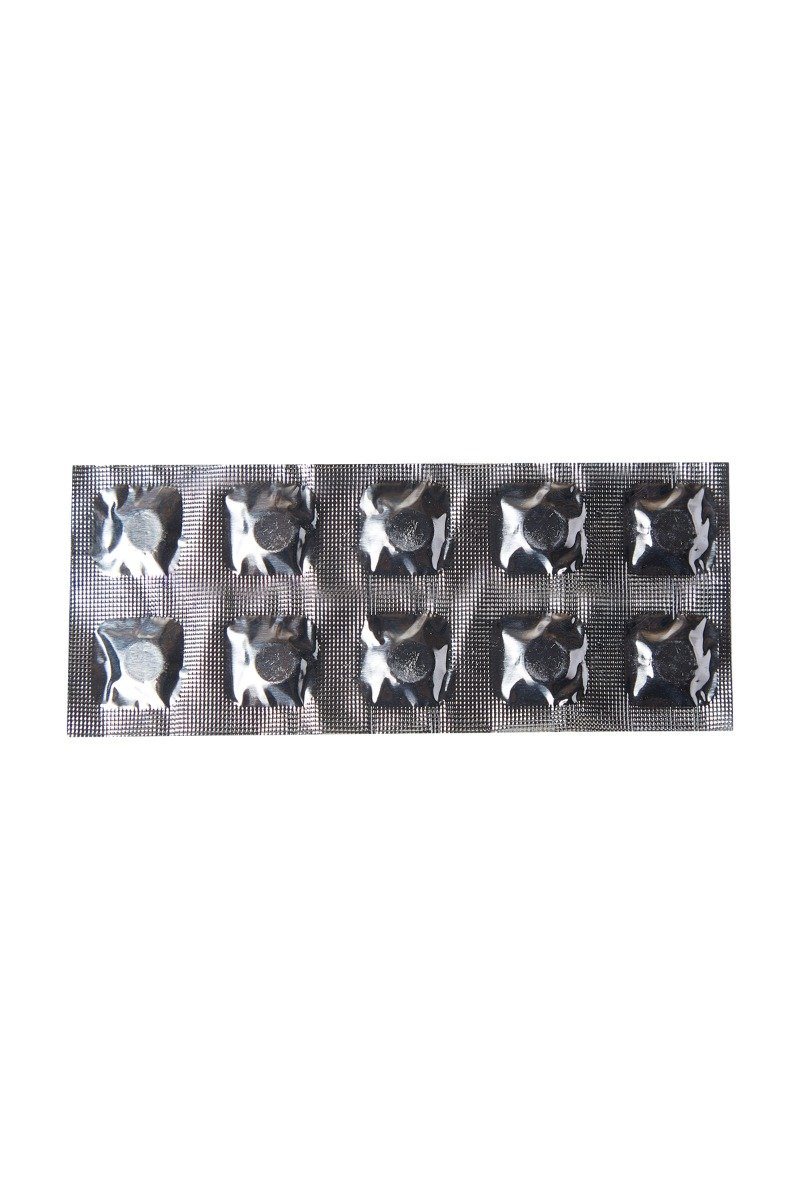Domperidone
About Domperidone
Domperidone belongs to a class of medications known as 'dopamine antagonist' used to treat nausea (feeling sick) and vomit (being sick) in adults and adolescents 12 years or older. Besides this, it also helps in the treatment of indigestion. Nausea and vomiting are not diseases but are symptoms of many conditions like infections, motion sickness, an early stage of pregnancy, and gastroparesis (slow stomach emptying).
Domperidone contains domperidone, which prevents nausea and vomiting symptoms by blocking certain receptors (like dopamine and serotonin) that stimulate the vomiting centre (chemoreceptor trigger zone – CTZ) located in the brain. It also acts as a prokinetic agent that increases the upper gastrointestinal tract's motility and helps decrease stomach emptying time.
Take Domperidone as prescribed by your doctor. Symptoms of nausea and vomiting may usually resolve within 3-4 days after taking Domperidone. However, if it does not resolve even after this, stop taking this medicine and contact the doctor. Do not take Domperidone for longer than seven days. The most common side effect of Domperidone is dry mouth. This side effect is temporary and may resolve after some time; however, if this side persists, contact the doctor.
Do not consume Domperidone if you are hypersensitive to any components present in Domperidone. Before taking the Domperidone, inform your doctor if you suffer from liver or kidney problems. Prolonged intake of Domperidone may be associated with an increased risk of heart rhythm disorder (arrhythmia) and cardiac arrest (heart attack). This risk may be more likely in the elderly (those over 60 years old) or taking doses higher than 30 mg daily. Domperidone is not usually recommended in pregnancy and breastfeeding. But in some cases, domperidone is used to increase milk supply. However, it should be used only during breastfeeding if your physician considers this necessary. Ask your doctor for advice before taking this medicine. Adolescents (children from 12-18 years of age) who weigh less than 35 kg should not be given the Domperidone.
Uses of Domperidone
Medicinal Benefits
Domperidone contains domperidone, a dopamine antagonist that helps by blocking certain vomiting-inducing receptors in the brain. Domperidone also acts as a prokinetic agent that increases the upper gastrointestinal tract's motility and decreases gastric emptying time. Domperidone is occasionally used to boost milk production. If you're experiencing difficulty nursing, your doctor may prescribe it if nothing else has helped.
Directions for Use
Storage
Side Effects of Domperidone
- Dry mouth
- Headache
Drug Warnings
Do not consume Domperidone if you are allergic to any components present in Domperidone. Before taking the Domperidone, contact your doctor if you suffer from liver or kidney problems (kidney function impairment or failure). Prolonged intake of Domperidone may be associated with an increased risk of heart rhythm disorder (arrhythmia) and cardiac arrest (heart attack). This risk may be more likely in the elderly (those over 60 years old) or taking doses higher than 30 mg daily. Tell your doctor if you are using anti-fungal medicines and/or if you have heart problems or AIDS/HIV. If you experience heart rhythm disorders like palpitations, trouble breathing, or loss of consciousness after taking the Domperidone, immediately contact your doctor. Domperidone is not usually recommended in pregnancy and breastfeeding. But in some cases, domperidone is used to increase milk supply. However, it should be used only during breastfeeding if your physician considers this necessary. Ask your doctor for advice before taking this medicine. Adolescents (children from 12-18 years of age) who weigh less than 35 kg should not be given the Domperidone.
Drug Interactions
Drug-Drug Interactions: Domperidone may interact with medicines used to treat heart problems or high blood pressure (e.g. amiodarone, dronedarone, quinidine, disopyramide, dofetilide, sotalol, diltiazem, verapamil), depression (e.g. citalopram, escitalopram), anti-cancer agents (e.g. toremifene, vandetanib, vincamine), bacterial infections (e.g. specifically erythromycin, clarithromycin, telithromycin, moxifloxacin, pentamidine), gastrointestinal disorders (e.g. cisapride, dolasetron, prucalopride), antimalarial (e.g. halofantrine), neuro related medicines (e.g. haloperidol, pimozide, sertindole), antifungal (e.g. ketoconazole, fluconazole, voriconazole), gastrointestinal drugs (e.g. cisapride, dolasetron, prucalopride) and anti HIV drugs.
Drug-Food Interactions: Domperidone may interact with grapefruit juice, alcohol, and tobacco. This may affect the efficacy of Domperidone. So, a Domperidone should not be taken along with them.
Drug-Disease Interactions: Caution should be exercised while using Domperidone in patients with heart, kidney, liver disease, brain tumours, history of gastrointestinal bleeding, or any problem involving the bowels.
Drug-Drug Interactions Checker List:
Safety Advice

Alcohol
cautionDrinking alcohol with Domperidone may cause sleepiness, or an irregular heartbeat.

Pregnancy
unsafeDomperidone is not usually recommended in pregnancy.

Breast Feeding
cautionDomperidone is not usually recommended when breastfeeding. But in some cases, domperidone is used to increase milk supply. However, it should be used only during breastfeeding if your physician considers this necessary. Ask your doctor for advice before taking this medicine.

Driving
safe if prescribedDomperidone has no effect on your ability to drive or operate machinery.

Liver
cautionDomperidone should be taken with precaution in patients with liver disease. Your doctor will weigh the benefits and potential risks before prescribing them. Please consult your doctor.

Kidney
cautionDomperidone should be taken with caution in patients with kidney problems. Your doctor will adjust your dose depending upon the condition of your disease.

Children
cautionDomperidone should not be given to adolescents younger than 12 years of age or are less than 35 kg in weight.
Habit Forming
Diet & Lifestyle Advise
- Eat a healthy low-fat diet, especially in small portions, as it will be easy to digest. Avoid eating over-sweet food and include more salty food, especially if you have been vomiting.
- Also, if you like vomiting at a specific time, avoid eating your favourite food at that particular time, as your taste for that food may get turned off.
- Include more cool beverages in your food like clear soups, flavoured gelatin, and carbonated beverages. And also, when you drink with a stray, sip slowly to avoid swallowing air that may lead to gas or acidity.
- Drink after or any other liquid at least 30 minutes after eating food. After eating food, lie down for at least after 2 hours.
- If the smell of food makes you feel sick (vomit), do not cook food as it may worsen your condition. Let someone else cook food or use prepared food from the freezer.
- Avoid caffeine-containing beverages (coffee, tea), spicy/deep-fried/processed foods, carbonated drinks, and acidic foods like citrus fruits/vegetables (tomatoes).
Patients Concern
Disease/Condition Glossary
Nausea is a feeling of stomach uneasiness that often comes before vomiting. On the other hand, vomiting is the forcible voluntary or involuntary emptying of stomach contents through the mouth. In short, nausea and vomiting are not diseases but are symptoms of many conditions like infections, motion sickness, an early stage of pregnancy, and gastroparesis (slow stomach emptying). A receptor in our brain known as the chemoreceptor zone (CTZ) controls vomiting.
FAQs
Domperidone contains domperidone, which prevents nausea and vomiting symptoms by blocking certain receptors (like dopamine and serotonin) that stimulate the vomiting centre (chemoreceptor trigger zone – CTZ) located in the brain. It also acts as a prokinetic agent that increases the upper gastrointestinal tract's motility and helps decrease stomach emptying time.
If you are intolerant to sugars, please inform your doctor before starting Domperidone as it contains lactose. So, to avoid any unpleasant side effects, do as your doctor advises.
Yes, Domperidone can cause dry mouth. In case you feel excessively thirsty, please increase your fluid intake and do frequent mouth rinses.
If you miss a dose, take your medicine as soon as you remember. If it is almost time for your next dose, wait until that is due and continue as usual. Do not take a double dose to make up for a forgotten dose.
Domperidone should be used for the shortest time. It is commonly taken for up to a week. Domperidone can produce irregular heartbeats if taken for an extended time or at a high dose.
No, it is a prescribed medication; it should be used only if specified by the doctor.








